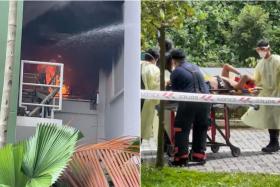Sports groups review safety protocols after hockey player's stroke
SHF chief says it will also meet its affiliates to discuss safety going forward
The lack of immediate medical attention for national hockey player Siti Nur Raihanah Waled, who suffered a stroke during a National Women's League match on Sunday, has sparked concerns about safety protocol in local sports.
Following the report in The New Paper yesterday, at least one national sports association (NSA) has said there is a lesson to learn from the incident, even as the Singapore Hockey Federation (SHF) announced it would deploy ambulances for the remainder of its league matches this season.
The Singapore Floorball Association (SFA) runs six men's and three women's leagues and all do not have any medical personnel on standby at matches.
Said SFA general manager Wendy Kuan: "We are now planning how we can improve our current practices.
"We will put up standard operating procedures that the teams can adhere to.
"On one hand, we know that sports in general can be dangerous and we understand the need for medical personnel but, on the other hand, it is hard in terms of the budget we have."
SHF president Mathavan Devadas said last night that ambulances will be deployed at league matches as an interim measure and the NSA will also meet its affiliates to discuss how best to maintain the safety of players going forward.
"If there are lapses in our current procedures, we want to make sure they are covered," he added.
The Singapore Ice Hockey Association, which also does not have medics at its league matches, said its referees are all trained in first aid, including using the automated external defibrillator.
Other NSAs such as the Football Association of Singapore (FAS) and Singapore Rugby Union (SRU) have standard protocol in place for their matches in the case of an injury.
400 GAMES A YEAR
The FAS organises about 400 games a year, including the professional Singapore Premier League, the amateur National Football League and Women's Premier League.
FAS general secretary Yazeen Buhari said that at each match, there will be an ambulance present with paramedics on standby.
The cost for such a safety measure could be as much as $1,300 a match, he added.
The SRU, which oversees more than 190 matches a year, has similar measures.
All matches have at least two certified healthcare professionals on standby and an ambulance on site.
SRU head of commercial, PR and communications Douglas Danapal said: "Player welfare is important. Not just at the point of incident but overall in terms of education, coaching, training, strength conditioning, match officiating, match management, injury prevention, proper immediate response, after care and return to play.
"Safety is our priority."
Get The New Paper on your phone with the free TNP app. Download from the Apple App Store or Google Play Store now



